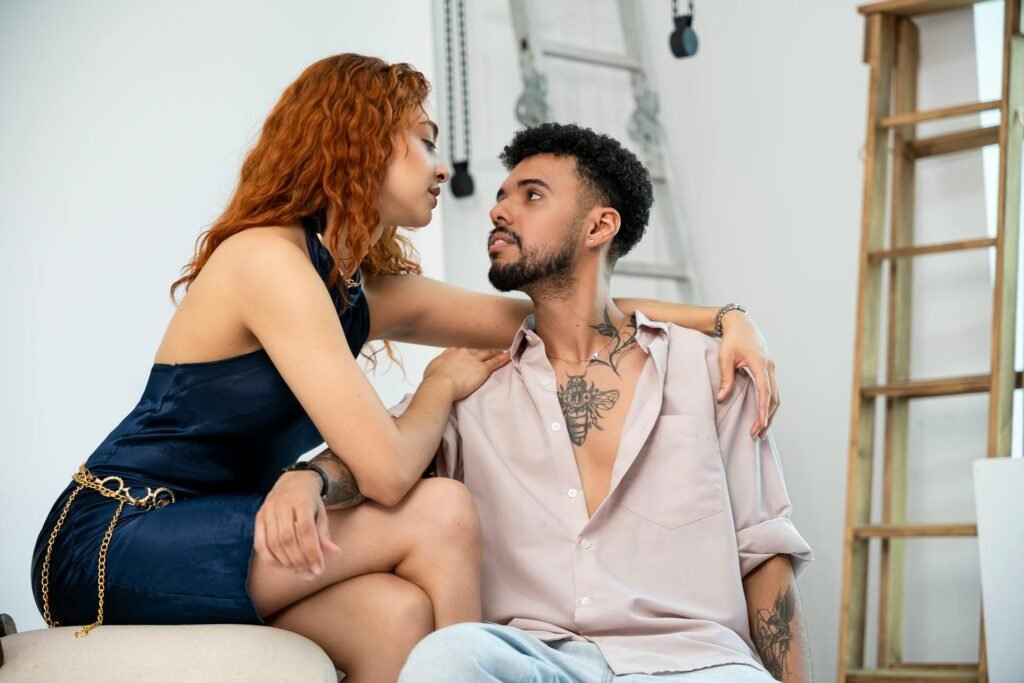Building healthy relationships is key for men’s happiness and well-being. As a man, I’ve learned that strong connections with partners, friends, and family take effort and commitment.
The secret to a thriving relationship is open communication, mutual respect, and emotional support.
I’ve found that many men struggle with expressing their feelings and needs in relationships. But being vulnerable and honest is crucial for building trust and intimacy.
It’s also important to actively listen to your partner and validate their emotions.
Showing appreciation and affection daily keeps the spark alive in romantic relationships. Simple gestures like hugs, compliments, and acts of service go a long way.
Remember, a strong relationship requires ongoing work and dedication from both people involved.
Key Takeaways
- Open communication and emotional support are vital for healthy relationships
- Expressing vulnerability and actively listening builds trust and intimacy
- Regular displays of affection and appreciation strengthen romantic bonds
Understanding the Foundations of a Healthy Relationship
Trust, respect, and open communication form the bedrock of strong partnerships. These elements, along with maintaining individuality, create a solid foundation for lasting connections.
The Importance of Trust and Respect
I believe trust and respect are essential in any relationship. Trust means I can rely on my partner to be honest and faithful. Respect involves valuing each other’s opinions and boundaries.
To build trust, I must be consistent in my words and actions. I need to follow through on promises and be there when my partner needs me.
Showing respect means listening without judgment and acknowledging my partner’s feelings. I should avoid criticism and instead offer support and understanding.
When trust and respect are present, I feel secure and valued in the relationship. This creates a safe space for both of us to be vulnerable and grow together.
Communication: The Heart of Connection
Open communication is vital for a healthy relationship. I need to express my thoughts and feelings clearly and listen actively to my partner.
Good communication involves:
- Being honest about my needs and concerns
- Listening without interrupting
- Asking questions to understand better
- Using “I” statements to express feelings
- Avoiding blame or criticism
I should make time for regular check-ins with my partner. This helps address issues before they become big problems.
Non-verbal communication matters too. I need to pay attention to body language and tone of voice, both mine and my partner’s.

Maintaining Individuality Within a Partnership
While being part of a couple is important, I shouldn’t lose my sense of self. Maintaining individuality keeps the relationship fresh and balanced.
I need to:
- Pursue my own interests and hobbies
- Spend time with friends and family
- Set personal goals and work towards them
- Respect my partner’s need for alone time
It’s healthy to have separate activities and friends. This gives us new experiences to share and keeps our conversations interesting.
I should encourage my partner’s growth and celebrate their achievements. Supporting each other’s dreams strengthens our bond while allowing us to evolve as individuals.
Cultivating Emotional Intimacy and Support
Emotional intimacy is key for strong relationships. I’ll share ways to open up, provide support, and deepen your connection through quality time and physical intimacy.
Navigating Vulnerability and Emotional Expression
Being vulnerable isn’t easy, but it’s crucial for building emotional intimacy. I’ve learned to start small by sharing minor concerns or fears. This helps build trust gradually.
I practice active listening when my partner opens up. I give my full attention and avoid interrupting or judging.
Expressing emotions can be challenging. I use “I feel” statements to communicate clearly. For example, “I feel frustrated when…” instead of blaming.
It’s okay to ask for help with emotional expression. A therapist or counselor can provide tools and guidance.
Building and Sustaining Emotional Support
Emotional support is about being there for each other. I make an effort to check in regularly with my partner about their day and feelings.
When my partner is going through a tough time, I offer a listening ear without trying to fix everything. Sometimes, they just need to be heard.
I’ve found that small gestures can make a big difference. Sending an encouraging text or leaving a supportive note shows I care.
It’s important to communicate my own needs for support too. I let my partner know when I need extra care or understanding.
Importance of Quality Time Together
Quality time strengthens our bond. I make it a priority to have regular date nights, even if it’s just a simple activity at home.
I put away distractions like phones during our time together. This helps us focus on each other and have meaningful conversations.
Trying new experiences together can reignite the spark. I suggest activities we both might enjoy, like cooking classes or hiking trips.
Everyday moments matter too. I try to be fully present during meals or while running errands together.
Physical intimacy as a gift to each other
Physical intimacy goes beyond sex.
I show affection through hugs, hand-holding, and gentle touches throughout the day.
I communicate openly about desires and boundaries.
This creates a safe space for both of us to express ourselves.
Non-sexual physical intimacy is important too.
I offer massages or cuddling without expectation of it leading to sex.
I view intimacy as a way to connect and show love, not just a physical act.
This mindset helps deepen our emotional bond.

Effective Communication and Conflict Resolution
Good communication and conflict resolution are key to building strong relationships.
I’ll share tips to improve these vital skills.
Mastering Active Listening and Honest Dialogue
I’ve found that active listening is crucial for understanding my partner.
I make eye contact, nod, and ask questions to show I’m engaged. I avoid interrupting and focus on truly hearing what they’re saying.
Honesty is also essential.
I express my thoughts and feelings clearly and directly.
I use “I” statements to own my emotions without blaming others. For example, “I feel frustrated when…” instead of “You always…”
I practice emotional expression by naming my feelings out loud.
This helps me communicate more effectively and allows my partner to understand me better.
Resolving Conflicts with Empathy and Clarity
When conflicts arise, I stay calm and approach the issue with empathy.
I try to see things from my partner’s perspective. This helps me find common ground and work towards solutions together.
I use clear, simple language to explain my point of view.
I avoid accusations and focus on the specific issue at hand.
I suggest concrete steps we can take to resolve the problem.
I’m open to compromise and finding win-win solutions.
If we’re stuck, I might suggest taking a short break to cool off before continuing our discussion.
Expressing Affection and Appreciation
Showing affection and appreciation is key to building strong relationships.
I’ll share ways to express love and gratitude that can deepen your connection.
Understanding and Utilizing Love Languages
I find that knowing your partner’s love language helps you express affection more effectively.
The five love languages are words of affirmation, acts of service, receiving gifts, quality time, and physical touch.
I suggest asking your partner which actions make them feel most loved.
For example, if their language is words of affirmation, I make an effort to compliment them daily. If it’s acts of service, I might surprise them by doing chores they usually handle.
I also think it’s important to communicate your own love language.
This helps your partner understand how to make you feel appreciated and loved.
Physical affection like hugs, kisses, and hand-holding can be powerful too.
I make sure to incorporate these regularly, respecting my partner’s comfort level.
Creating Moments of Romantic Connection
I believe that intentional date nights are crucial for maintaining intimacy.
I plan regular outings or stay-at-home dates to keep the spark alive.
Here are some ideas I use:
- Cooking a fancy meal together
- Taking a dance class
- Having a picnic in a scenic spot
- Recreating our first date
I also create daily moments of connection.
This might be a quick kiss before work or a loving text during the day. These small gestures add up.
I make an effort to show appreciation regularly.
I thank my partner for specific things they do, both big and small. This helps them feel valued and strengthens our bond.




